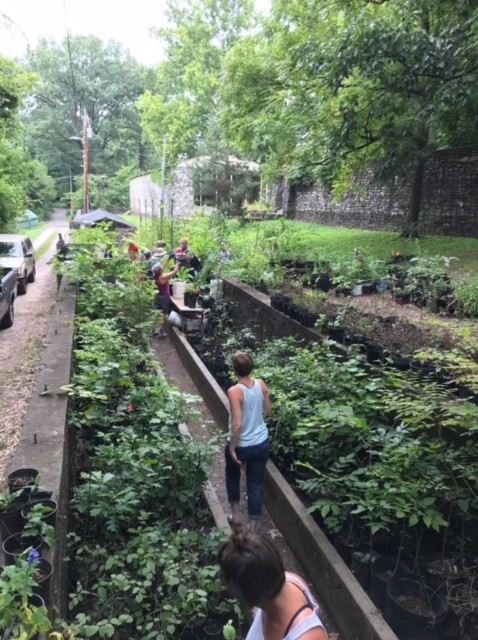Tucked in the back of the Knoxville Botanical Gardens on Wimpole Avenue in East Knoxville are rows upon rows of plants waiting to find new homes.
There you will find wild columbine, yellow trillium, mistflower, little bluestem grass and wild plum trees among the 80-plus species available from the Native Plant Rescue Squad (NPRS).

Joy Grissom and Gerry Moll are the founders of the Native Plant Rescue Squad.
Founded in 2015 by Gerry Moll and Joy Grissom, the NPRS works in cooperation with area developers, builders and private land owners to save native plant species from construction and timber sites. The non-profit organization is not anti-development, just pro-preservation of plants native to Tennessee. After the hard and often hot work of collecting plants, the next step is selling them to the community to get them into landscaping, backyards and neighborhood garden projects.
Getting native plants into landscapes can sometimes be a hard sell for gardeners accustomed to more orderly plantings of predominantly non-native or cultivated hybrid species stuck in beds of mulch, according to Grissom.
“Native plants are more readily accessible, they grow here, they’re adapted here. Sometimes all it takes is showing them in a landscape,” Grissom said.
Volunteer Lynne Davis stumbled upon the NPRS with her walking group over 2 years ago and has worked with them ever since. She said “once established, native plants are a lot less work. They come back every year, increase on their own, and you generally don’t have to do much watering. These rescued plants need to find new homes where they’d be appreciated.”
Moll said the preservation of native plants is essential to restoring biodiversity and the survival of pollinator butterfly species, many of which require specific host plants to lay their eggs and that the resultant caterpillars will eat. Monarchs require milkweeds, gulf fritillaries require passion vines (maypops), and Tennessee’s state butterfly, the zebra swallowtail, requires pawpaw trees, to name but a few.
“It’s about more than landscaping and just having a row of something in full bloom,” he said. “What we’re doing is for humanity. It’s about supporting habitat and our local ecology.”
Due to the COVID-19 crisis, the NPRS has halted their open volunteer gatherings on Tuesdays and participation in area farmers markets, where they normally have a booth. Rescue operations are still ongoing, and plants can still be purchased with arranged meet-ups at the Botanical Gardens or Moll’s residence.
“We’re operating with a slim, core crew at the moment,” he said, but added that the additional free time has allowed NPRS to focus on other issues, like adding board members and streamlining their social media presence.
Grissom said that even though some aspects of operations are on hold or reduced, she would like to see their straight species plants become readily available at area nurseries. She said the NPRS could use donations of used metal mini blinds for plant ID tags as they wish to avoid using plastic. In addition to wanting more people to purchase their native plants for their gardens, the NPRS is available for consultations and installations.
You can find out more about the NPRS, the plants they currently have available or notify them of a potential rescue site at their website or Facebook page.
Beth Kinnane is a freelance writer and thoroughbred bloodstock agent.

